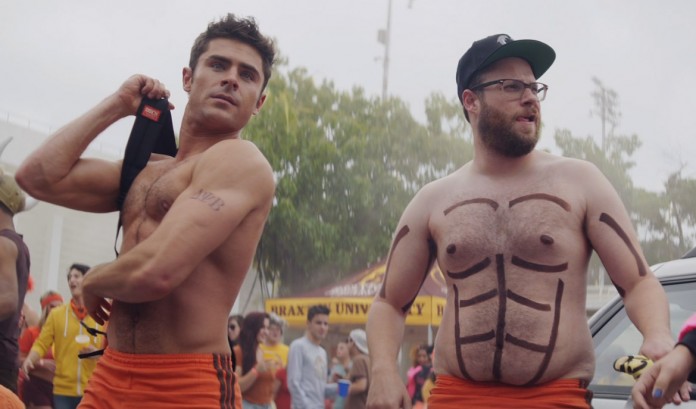In Nicholas Stoller’s follow-up to Bad Neighbours, we immerse ourselves, yet again, into the lives of young parents Kelly (Rose Byrne) and Mac (Seth Rogen). Having finally dispensed themselves of the unforgiving, uninhibited fraternity next door, they’re aggrieved to discover that they now have another, equally as menacing prospect on the horizon; a sorority.
Two years have passed, and Mac and Kelly’s daughter is growing up, and the couple have since decided to put their house on the market, and move to a new area. With prospective buyers verbally agreeing, they enter into a period of escrow, whereby they have a month until the selling of the house can be made official. Needing desperately to uphold the claim that the area is free of disruptive teenagers, any such wishes are washed away with the introduction of Shelby (Chloe Grace Moretz) and her two new friends, Beth (Kiersey Clemons) and Nora (Beanie Feldstein).
The trio are disillusioned with the male-dominated, sexist parties being thrown, so in a bid to set their own rules, they open up their own sorority house – and it just so happens to be next door to Mac and Kelly. The exasperated couple are all out of options, so require the assistance of an old foe, Teddy Sanders (Zac Efron).
This seemingly superfluous sequel has been deemed worthy for subverting expectations so dramatically, in what is a refreshingly feminist mainstream comedy. Affectionately poking fun and ridiculing the sexist college fraternity culture, Stoller empowers his female protagonists. Vitally, they remain flawed too, naïve and irresponsible in parts, which only heightens the somewhat pointed message behind this endeavour, for it remains authentic, never heroising the subjects. But where this picture truly excels is within the ability to maintain the severity attached to this pertinent issue, while balancing the sheer irreverence of the surrealist comedic tropes.
Stoller plays on the notion of maturity, for the majority of those who will see this film are likely to find themselves siding with the parents, despite probably being closer in age to the antagonist students. You identify with Mac and Kelly (not to mention the fact they remain full of youthful exuberance, away from their parenting duties) and you see this solely from their perspective, suddenly becoming aware of your own juvenile ignorance from that age.
In what is a rare scenario whereby a comedy sequel is as good, if not even better, than what came before – this picture actually offers more variety, both in the narrative and the humour, not following nearly as repetitive a formula as the preceding endeavour did, and the finished product is all the better for it.









